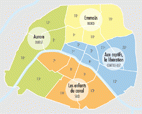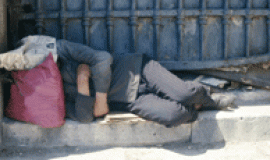
The problem of homelessness in Paris and the inner suburbs does not leave the general public indifferent. They may be annoyed, concerned, disgusted, uninterested ....The care system has been progressively re-structured and improved, particularly in Paris, in order to deal with an ever-growing, ever-more diverse succession of demands. While the State retains primary responsibility for housing, the City of Paris has made social solidarity a priority in its municipal activities. The City of Paris has encouraged and supported the coordination of mobile relief teams as well as the creation of specialist relief teams. It has increased the number of day care centres, administrative support centres, washrooms and soup kitchens. Baggage rooms are becoming more widespread and the emergency temporary accommodation services provided 13,296 overnight beds in 2011 – 2012. The offer of temporary shelter using premises waiting to be renovated has also been developed. The social solidarity manual -Le Guide des Solidarités- demonstates the extensive facilities available and devoted to the homeless.
This study has recently been boosted by a set of forward-looking proposals aiming to complement the provision of care through the use of extreme emergency, temporary and mobile solutions in an endeavour to counteract the bottleneck situation in the reception centres and housing services with an ever growing numbers of homeless people in the public arena.
This versatile policy has made it possible to protect people from becoming too vulnerable, to support those in the greatest difficulty and to coordinate all the key-players responsible for them. It is a question of bringing a variety of responses to the diverse situations and supporting sustainable inclusion.


